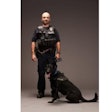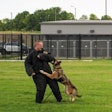Even Sheriff Andy Taylor of Mayberry knew it better to be underestimated by his adversaries.
I am from a small, county police department in Southern Indiana on the Ohio River, just across from Louisville, Ky.
They have a full-time gang squad.
So far, we've been lucky. We've always thought that the liver had kept big city clime out of our community.
We have one city in our county, New Albany, with a police force of about 6S officers. The county also has two small towns: Georgetown, with three police officers:, and Greenville, with one pat1-time town marshal. The Floyd County police are responsible for all of the unincorporated areas and provide backup as needed.
I was put into the Criminal Investigation Division with instructions from my boss to get a jump on any potential gang problem. I wil1ingly took the assignment and, with a total countywide population just under 100,000, thought it would be an easy one,
I started by getting educated about gangs and attended several trainings and meetings. I learned about the West Coast problems and the Chicago-based gangs. I then got involved in a county gang force, where school officials met with officers to discuss problems.
Armed with my new education, I set out to learn about my local area. I soon recruited a fellow officer, assigned to the patrol division, to assist me in my quest for knowledge and intel1igence infom1ation. Together, we petitioned our boss to pay for membership in the Midwest Gang Investigators Association. which put us in touch with gang investigators al1 over the Midwest. We then set out to locate graffiti and other gang signs in our community.
We were surprised at what we saw in the graffiti that had gone unnoticed prior to our education. We quickly discovered that gang members liked our community. They enjoyed not having to fight for territory. They liked the fact that we didn't have a gang problem nor could we recognize it.
We also found that we did not have a large group of anyone gang or sub-set of a gang. Instead, we had a little of everything: Bloods, West Side Crips, as well as Gangster Disciples out of Chicago - to name a few.
Aside from finding that gangs liked our type of "Mayberry" because we did not have a clue about gang culture, we learned that we were considered "virgin territory" - a new market for the drug trade.
So how did they find us?
Well, like a lot of you, we are on a major interstate - a convenient stopping place for gang members on the move. We also have a military instal1ation nearby. I was surprised to learn that the military has a gang problem and that gangs are even sending members into the military for some of the same reasons I was in for: education, police experience and weapons training. Then there is the problem of parents sending unruly children (gang members) to a small town (healthy environment). The kid decides he can start his own gang and be the boss, where he was only a soldier before. And he probably didn't get rid of his friends' numbers in the big city and will now reach out and touch them to establish his business.
We decided that the "wanna be" was best described as a "gonna be." These kids wil1 do anything to belong to the group and should be considered dangerous. You can get into a gang by being beaten in or "blessed in." If you didn't know, you are blessed in by committing an act that is extreme. Hm1ing an officer or killing someone would be at the top of this list.
Educate your front line officers and introduce field contact forms to help them identify gang members. Use your jails to gather gang intelligence. Educate your jail staff and suggest the addition of gang identification questions to the intake process. Public education can also go a long way in combating gangs.
Give gang members no breaks.
If you are taking on the new task of combating gang activity in a small town, you have one thing on your side: The gang member thinks you are a stupid local cop who knows nothing about them or their culture. This can be an advantage. When confronting possible gang members, remain tactically prepared, but it sometimes pays to act as if you are unaware of the gang culture. Ask them a lot of questions about signs, symbols and colors that they may be wearing, even if you know the answer. You may be surprised at what kinds of information you can uncover.
Stay safe and never give up.
Detective Carr T. Martin has worked with the Floyd County (Ind.) Police for seven rears. He is a certified instructor for the Indiana Law Enforcement Training Center and is assistant commander for his department's SWAT team.













